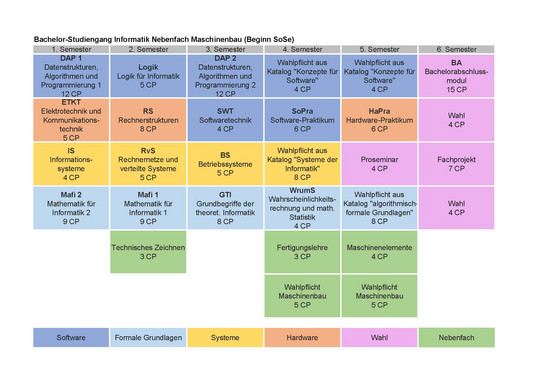Study plan Bachelor's degree program in Computer Science with minor in Mechanical Engineering
Study plans help you to organize your studies. Please refer to the notes on the generic study plan.
The following study plans address special features of the minor in mechanical engineering. Please consider these plans as a recommendation and a suggestion to plan your studies.

Structure of the bachelor's degree program in computer science
The bachelor's program in computer science is a full-time and attendance-based program with a standard period of study of six semesters (three years) and is completed with the degree Bachelor of Science (B.Sc.).
Software cycle (dark blue) In the courses of the software cycle you learn to develop software. The spectrum ranges from the creation of small programs to the investigation of the efficiency of certain algorithms to the development of larger projects in a team.
Systems Cycle (orange) You will learn about important systems in computer science: Operating systems, computer networks, distributed systems, and information systems (databases). They are part of the toolkit of every computer scientist.
Hardware cycle (red) Many problems cannot be solved without an understanding of computer architecture, electrical engineering and communications engineering, which you will learn in the hardware cycle. In the hardware lab, you will apply this knowledge to building robots, among other things.
Formal-Basic cycle (light blue) Computer science uses formal methods that you learn in the math and theory courses to analyze and efficiently solve practical problems.
Electives (purple) The bachelor's degree program in computer science offers you a maximum of elective options. This is ensured by more than 20 university professors and their staff. In the Proseminar, you will learn about scientific work on a topic that particularly interests you. In the subject project, you will be given challenging tasks through which you can apply what you have learned so far in a team. This will prepare you for a successful bachelor thesis.
Minor subject (green) As a computer scientist you will work in an interdisciplinary way. You can choose the minor that prepares you for this according to your interests, e.g. electrical engineering, logistics, mechanical engineering, mathematics, philosophy, physics, rehabilitation technology, statistics, theoretical medicine, economics or an individual minor that suits your ideas.
Practical experience in the Bachelor's program
You will apply the knowledge imparted in lectures not only in practice groups, but also in the internships integrated into the curriculum. In the software internship, you will work on challenging software projects in groups to gain valuable programming experience and skills such as teamwork and project management. The undergraduate project also involves challenging tasks that are worked on in a group.

![[Translate to English:] [Translate to English:]](/storages/zentraler_bilderpool/_processed_/d/f/csm_Informatik_275ba5e5fc.jpg)

![[Translate to English:] [Translate to English:]](/storages/zentraler_bilderpool/_processed_/1/b/csm_Figuren-nachdenklich_e2435967dd.jpg)
![[Translate to English:] [Translate to English:]](/storages/cs/_processed_/6/f/csm_teamwork1_e113f5f13b.png)
![[Translate to English:] [Translate to English:]](/storages/cs/_processed_/e/1/csm_header_ee496f74bf.png)